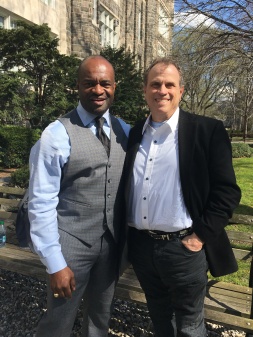
Professor Percesepe invited Maurice Smith to his Philosophy of Human Nature class to discuss law, sports and Plato. (Cate Carrejo/The Fordham Ram)
By Cate Carrejo
Professor Gary Percesepe’s philosophy of human nature class hosted a guest lecturer DeMaurice Smith, executive director of the National Football League Players’ Association (NFLPA), on Friday. Smith, a former National League Football player, connected his work with budding football icons to Plato’s Allegory of the Cave.
“The illusion of Plato’s Cave is always a great frame for me, because while our players are in the middle of living this dream, it is the best, most crystalized, most colorful illusion that you could possibly live in,” Smith said, speaking to the overnight fame and fortune that ebbs and flows for many football stars. “I become the person who, if you follow the allegory, will step outside of the cave and realize that there’s actually reality.”
Much of Smith’s job is making sure the players have a backup plan when that illusion inevitably comes crashing down. The NFLPA is in charge of helping players transition after their football careers are over, as well as representing players’ interests in wages, hours, and working conditions. Smith boasted that over 90 percent of his players fully enrolled in their 401ks, a sign that they are consciously preparing for their time after the league.
Smith saw the illusion reaching into college sports as well. “I went to a small liberal arts school where I ran track,” Smith said. “I look at that as an integral part of my college experience, but there was a balance. The shame of college sports is that the balance is out of whack.”
According to Smith, the difference seems to be college players’ lack of an organization like the NFLPA and a neutral, protective interest like himself.
“If you’re in a world where it makes it tough for those students to get the education that they were promised, then you have to ask yourself, ‘Is the institution doing what it’s supposed to do anyway?’” he said. “The problem I think at its core is that for over 100 years the NCAA has been unwilling or unable to address these issues.”
Smith pointed out parallels to college careers and the average player’s career timeline. Just as Smith advises his players for their post-football careers and making the most of their time in the league, he gave Professor Precesepe’s students advice for their post-graduate careers and utilizing the tools of their institution.
“The reason why [the humanities] are so important is after you leave your undergraduate institution, it will be the last time that you engage in this kind of discussions in this formalized, institutionalized manner,” said Smith. “Because then we all move into the paradigm and the rules of the paradigm.”
Smith said that he fears a deemphasis on education in higher education institutions, and blames it for the “erosion of our democratic society as we know it.”
Smith had extra wisdom for students specifically looking to emulate his own career paths in law and sports. For both, Smith warned of going in too deep too soon.
“The difference between a good lawyer and a great lawyer is who can be creative,” said Smith, extolling the virtues of a liberal arts education in critical thinking and problem solving. “Our job is to take issues and problems that don’t have answers and to come up with creative interesting ways to think about them.”
That need for outside the box thinking is why Smith firmly recommends against taking law classes in college.
“I would avoid just about any class that had to do with law in college,” he told the class. “Law school… really prides itself on teaching you how to think, [and] law classes in college end up teaching you what they think you should know about the law.”
For those interested in a career in sports, Smith suggested choosing a business specialty rather than pursing general sports business, stating that how experienced one is in a given trade is more important than if their trade is niche. “If we’re looking for a lawyer, I don’t hire a sports lawyer, I find a really good lawyer,” he said. “It seems to me that the people we look for, the people I look for to hire, are people who are creative in thought.”
The Allegory of the Cave connects to his work in the NFL, Smith said, as it addresses the importance of professionalism.
“I talk to our players about organized labor outside of the context of football,” he said. “It’s important for our guys to view the football field and the locker room as a workplace.” Again, the parallels to college careers are evident.
“Typically it takes about two years, two and a half years for you to figure out in the National Football League that this all an illusion,” he said. “The downside, you only play for about three and a half years before you’re out.”
